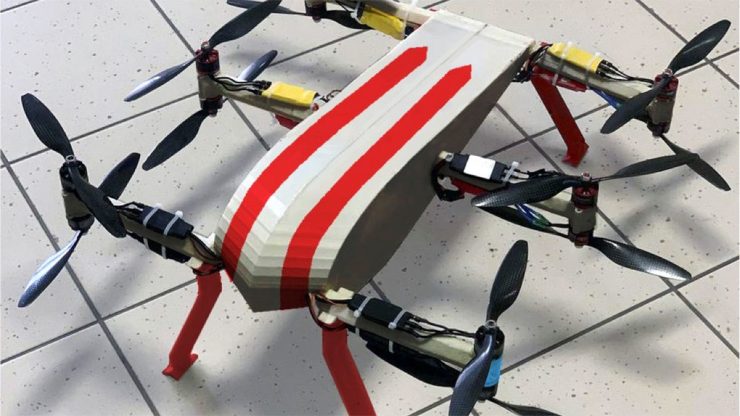STARTUPS
Russian company Platforma NTI designed a cargo drone called Aladdin, which is capable of delivering a cargo of up to 250 kilograms over the distance of 150 kilometers. The company attracted interest from the Russian Ministry of Defense and some manufacturers, Vedomosti reports. [Source: Vedomosti]
US- and Netherlands-based startup for remote work Miro, valued at $17.5 billion, with Russian founders Andrey Khusid and Oleg Shardin announced it would close its Russian entity. The company said in March it no longer had employees in the country and promised its former staff to help with relocation. [Source: RB]
Telegram will introduce a premium subscription in June. The new plan will allow the users to get additional features, speed and resources, with all the existing features remaining free. [Source: Pavel Durov’s TG-channel]
Ukrainian authorities, startups, venture platforms and associations have launched an online survey “Three months at war: The voice of Ukrainian Startups” that can be found here. The survey will evaluate the impact of Russia’s aggression against Ukraine on the local startup scene. [Source: TechUkraine]
The Moscow Exchange has acquired 10% of a crowdfunding platform called Potok in a deal estimated at $263,000 to $439,000. The exchange aims to get additional expertise in funding small businesses. [Source: Kommersant]
BANKS
VTB Bank bought 100,000 licenses of the Russian version of Microsoft Office valued at $21 million, making it the biggest transaction for the Russian software market. [Source: Vedomosti]
Russian banks started to refuse processing payments from Russian musical labels to foreign rights holders. The banks are afraid of possible violation of anti-sanction legislation introduced by Russian authorities. [Source: Kommersant]
The Russian biggest bank Sber will close SberGames, its game development subsidiary, saying its 200-strong staff will be redirected to other bank’s subsidiaries and departments. The move was explained by “external restrictions on Russian game developers”. [Source: Forbes]
Deutsche Bank relocated its Russian employees and families during the first months after Russia’s invasion of Ukraine. The bank had reportedly nearly 1,500 IT staff in Moscow and St. Petersburg, of which almost half agreed to relocate to Berlin. [Source: Kommersant]
COMMUNICATIONS
Russian business group AFK Systema’s subsidiary Citronicks designed a remote Earth sensing system consisting of 157 satellites. The satellites that will help in navigation and detecting fires are planned to be launched till 2025. [Source: Kommersant]
First Russia-made equipment for 4G networks will be produced in two to three years. This will likely be manufactured by company Yadro that said it would start to produce such equipment after Finland’s Nokia had said it would leave the Russian market due to the invasion of Ukraine. [Source: TASS]
REGULATION
The Russian government will allocate nearly $16 million for digital technologies in the national agriculture sector. The primary goal is to enhance the accuracy of harvest forecasting. [Source: TASS]
Russian law enforcement opened 954 criminal cases linked to cryptocurrencies in 2021, a 40% jump compared with 2020. Most of the cases were opened on charges of illegal drugs trade, money laundering, gambling for which cryptocurrencies were used. [Source: Izvestia]
RISE OF ANALOGUES
Russian banks are considering purchase of Russian-made automatic teller machines (ATM), with Russia-made central processing unit Elbrus due to be delivered in 2023. At the moment, only imported ATMs work in Russia, with two major overseas suppliers having claimed they would leave the country’s market. [Source: RBC]
Russian electric scooter service toGO Sharing created a Russia-made GPS-tracker, since the startup is now relying on components that are subject to Western sanctions. [Source: RB]
50% of Russians are satisfied with Russian software, 60% of this share have been using it for a few years, a survey found. The most popular software are Internet browsers and antiviruses, while operating systems, CRMs, video conference programs, and cloud services are much less popular. [Source: Spark]
IT TALENT
Almost 6,000 applications for preferential mortgages from IT specialists were accepted and approved by Russian banks, with 166 loans already given. The tool was introduced by the Russian government soon after the start of the war in Ukraine to prevent a massive brain drain among hi-tech professionals. [Source: TASS]
In 2022, investments in the online education market for adults will only be 20% of the total last year. Overall the online education market set to rise just by 20% this year instead of 50% forecasted before the war in Ukraine. The biggest drop is likely to be seen in the corporate segment as business slash expenses for employees’ education. [Source: Kommersant]






Add comment